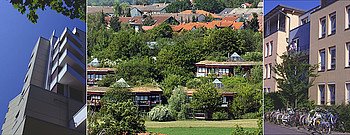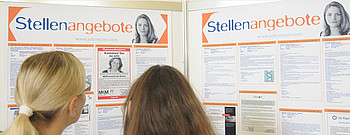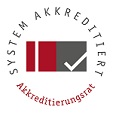Sustainable Biobased Technology Master’s
Implementing sustainability and helping to shape the future
The degree programs provide you with knowledge about technologies that use sustainable resources instead of fossil fuels. Residual biomass serves as a source of carbon, ensuring that nutrients are recycled and reused. The principle and development of biorefineries is an essential technology for this process, and you will actively help to shape and develop biorefineries in a practical way. You deal with biomass-based value chains and work on projects with a focus on sustainable technologies that learn from nature and are in harmony with it. This puts you at the cutting edge and allows you to contribute to technology structures that are ready for the future.
What you can expect:
- Highly relevant to praxis
- Options for individualizing your studies, for example in cooperation with the KIT (Karlsruhe Institute of Technology)
- Very good career prospects in industry, research, and other areas (ministries, for example)
- Always at the cutting edge of research and development
| Degree Master of Science (M.Sc.) |
4 semesters 120 credits |
Language German |
University places unlimited |
Location Stuttgart |
|||||

The compulsory modules are limited to one semester. During this time, you gain basic knowledge of sustainability assessment and modern technologies. After that, you are completely free to delve into the topics that interest you.
You can find information on the individual modules in the module descriptions.
You want to know more?
Detailed information about the course and structure of the degree program can be downloaded here:
Flyer (to follow)
Curriculum (to follow)
Admission regulations (to follow)
- Academic program advising
- Module descriptions (to follow)
- Examination regulations (to follow)
- Internship
What you should bring with you
The Master's degree program in Sustainable Biobased Technology requires knowledge of general natural sciences and/or engineering or process engineering knowledge as taught in Bachelor's degree programs in Sustainable energies, biobased products and bioenergy, bioenergy, chemical engineering, forestry, or agricultural or environmental sciences. If you have completed one of these Bachelor's degree programs, or a related degree program, the Master's in Sustainable Biobased Technology is just right for you.
The formal requirements for the Master's program are:
- Bachelor’s degree in biobased products and bioenergy or a related degree program from a university in Germany or abroad or from a university of applied sciences with at least 3 years of standard study time (180 ECTS in total) (for further “related subjects,” see Annex 2 of the Admission Regulations)
- If the final grade or grade point average of this degree is not above average, special aptitude for the degree program can be proven if necessary (for details see Admission Regulations § 4).
Because the number of places is not limited, everyone who fulfills the formal requirements and successfully completes the application process is admitted to the program!
You can find more information in the admission regulations and on our Checklist for Application Documents.
You should have the following interests and knowledge in addition to the formal criteria:
- Interest in the application of new, sustainable technologies
- Understanding of agronomy and natural sciences as well as technical know-how
- Open mind when it comes to current topics such as sustainability and AI
- Desire to learn more about interdisciplinary working methods
Interesting and individual career prospects
Use your knowledge to make the world more sustainable.
The following career paths are open to you:
- Project manager or project engineer in the industrial sector, in particular in the automotive, packaging, pharmaceutical, food, or waste industries, or with energy producers or suppliers, especially in the field of renewable energies
- Consultant for various companies and government authorities, e.g., in engineering offices, ministries, etc.
- Researcher at a university, non-university research institution, or industry-related institutes
The Master's program qualifies students for starting a doctorate, assuming their grades are above average.
Alumni of the Master's degree program Biobased Products and Bioenergy
What makes our degree program so special?
- A lot of freedom to pursue your interests
- Cutting-edge research in which you can work actively
- Good cooperation with companies and universities in Germany and around the world
First Place not Once but Three Times: The current Global Universities Ranking from U.S. News & World Report, the renowned NTU ranking, QS World University Ranking, and dathe Center of World University Ranking put University of Hohenheim’s agricultural research in 1st place in Germany.
In the agricultural university ranking from top agrar, the agricultural students at the University of Hohenheim give the grades 1.5 to 2.0. According to the ranking 2016, 88% of the students surveyed would recommend the University of Hohenheim for agricultural studies.
The University of Hohenheim puts great importance on quality teaching, which is demonstrated by several award-winning reform projects.
These projects include for example mobile teaching (German e-learning innovation and young scientists award (d-elina) in the category “Campus” at the BITKOM) or the ethics module, developed by the student group FRESH and awarded by the UN.

Extensive selection options make specialization or diversification possible. Students can choose from more than 200 modules offered by of the Faculties of Agricultural Science. Upon request, they can even select from all of the Master’s modules offered by the University of Hohenheim and the other cooperating universities.

The vision of the Faculty of Agricultural Sciences is a global agricultural system which is productive, environmentally-friendly and socially-minded, and which is in harmony with society’s demand for a multi-purpose orientation.
Agricultural research at the University of Hohenheim is focused on four areas:
- Food for all: Security of global food supply
- Hazard prevention: Climate change and scarcity of resources
- Beyond fossil fuels: Bioenergy and bio-based value-creation networks
- Diversity instead of monoculture: Genome Diversity in Agriculture
There are no easy answers to these kinds of questions. That is why agricultural researchers at the University of Hohenheim work across disciplinary boundaries, collaborating with colleagues in the natural sciences, business administration and economics, and the social sciences, for instance in bioeconomics, a field of research and teaching that will become even more important in the future. That collaboration also has an impact on teaching.
Number 1 in internationalization: In the current EU ranking U-Multirank, the University of Hohenheim has a top spot in internationalization.
The basis for this placing is the decades-long, global commitment of the Agricultural Sciences. Especially our tropics research with 10 professorships has made the University known around the world.
International opportunities for students:
- 80 partner institutions worldwide (40 of which are in the Erasmus+ program)
- Member of the Euroleague for Life Sciences - the network for Europe’s best
- scholarship programs for travel, research, and exchange
- Worldwide alumni network
- Studies according to international standards for excellence and international competitiveness of graduates
Professors of the Faculty of Agricultural Sciences are in high demand.
The top experts include:
 | Chair of the scientific advisory council Prof. Dr. Martina Brockmeier The German Council of Science and Humanities is considered the highest-ranking advisory committee on topics of science in Germany. Its scientific members are appointed by the Federal President. |
 | In the Bioeconomy Council Prof. Dr. Regina Birner The Bioeconomy Council is an independent advisory committee for the German federal government. The goal: to establish a cross-sectoral and bio-based economy in Germany that uses as few fossil raw materials as possible. |
Further members in important commissions and expert lists
- Prof. Dr. Iris Lewandowski and Prof. Dr. Joachim Müller are members of the BMBF scientific advisory council "Agricultural Systems of the Future”
- Prof. Dr. Enno Bahrs is member of the BMEL scientific advisory council for biodiversity and genetic resources
- Expert lists on various agricultural topics

Scholarship and awards for studies, final theses, travel, and attending conferences: Thanks to many supporters, the University of Hohenheim has an unusually extensive scholarship culture.
Around 100,000 Euros is the total amount of all scholarships and awards that are presented each year at the Dies academicus.
More than 700 hectares of test area: Among German universities, the University of Hohenheim owns the largest amount of property. For students, this means a lot of room for their own experiments, research, and a great deal of hands-on experience.
Also directly on campus: State institutes for transferring science into practice, the Hohenheim Gardens, and the German Agricultural Museum.

The future lack of experts and managers in the area of agriculture / nutrition / horticulture means students of agricultural will have good career prospects. This was shown by a 2015 study by the Bundesverband Agrar Ernährung Umwelt (VDL).

The University of Hohenheim is a university with a long tradition. You will experience a truly unique university atmosphere enriched by the Baroque palace, the historic gardens and parks, and modern architecture: In 2009, the University of Hohenheim was declared the most beautiful campus university in the state.
In 2017, Hohenheim's President Stephan Dabbert was chosen by the German Association of University Professors and Lecturers (DHV) as the most popular president in Baden-Württemberg for the third year in a row. He was ranked second in all of Germany.
This jewel is located south of the state capital Stuttgart. Because it is close to Stuttgart, you have all the opportunities available in a big city. The University of Hohenheim is only a few minutes away from the airport, the Stuttgart Trade Fair Centre, and the autobahn and is easily reached with public transportation.
 | Unique party atmosphere: The historical Thomas-Müntzer-Scheuer, an old barn with a new purpose, is the party center of Hohenheim. |
 | The University ball in the pompous palace rooms is the social event of the year. |
You can complete part of your studies abroad. Talk to us and we'll show you the possibilities. We cooperate and have experience with a large number of universities worldwide.
The University of Hohenheim’s Office of International Affairs offers information and advising on stays abroad and how to finance them through scholarships.

Research-based learning, learning in order to act
Practical exercises, excursions, and small projects (e.g., as case studies) are integrated into the modules. Some modules only include practical work.
Gaining practical experience
- Voluntary internships can be recognized for credit (including ones completed abroad)
- Project work in research or the industrial sector (compulsory)
- Case studies with issues taken from companies and worked on in cooperation with them
- Master’s thesis can be completed in cooperation with a company
Expanding skills
Continuing education opportunities F.I.T, AIDAHO certificate, additional courses/offers from the faculty, Innovation Greenhouse
Learning from practice
Practical lectures, projects with companies, excursions, applied projects during your studies
Strengthening language and intercultural skills
Language courses, opportunities to go abroad
Researching during your studies
Projects, work on research projects, research modules
Information on current research topics can be found at agrar.uni-hohenheim.de.
| Application deadlines | |
|---|---|
| 1st subject-related semester | for the winter semester: preferably by 15 July so that all formal requirements can be met in time. Applications can be submitted until 15 September. for the summer semester: preferably by 15 January so that all formal requirements can be met in time. Applications can be submitted until 15 March. |
Higher subject-related semesters | for the winter semester: preferably by 15 July so that all formal requirements can be met in time. Applications can be submitted until 15 September. for the summer semester: preferably by 15 January so that all formal requirements can be met in time. Applications can be submitted until 15 March. |
| Requirements | |
|---|---|
| Formal requirements |
Because the number of places is not limited, everyone who fulfills the formal requirements and successfully completes the application process is admitted to the program! You can find more information in the admission regulations and on our Checklist for Application Documents. |
| Content requirements | Knowledge and understanding of agronomy and technical matters are expected |
| Language skills | German language proficiency required |
| Pre-study internship | no |
| Selection procedure | |
|---|---|
| Selection criteria | No An above-average grade in the Bachelor’s program (see admission regulations) is a requirement for admission, however |
| Selection interview | no |









